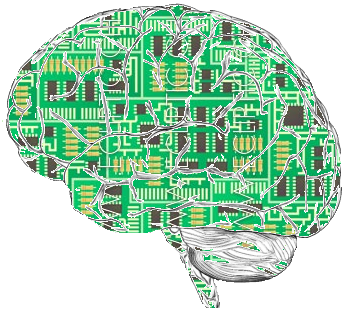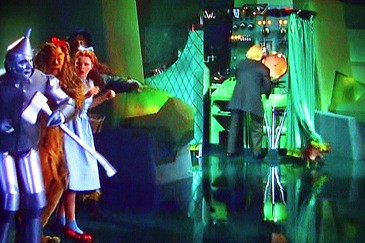Last month, former Skinner graduate student and radical
behaviorist Robert Epstein published an article on
Aeon that served as an attack on the Information Processing (IP)
metaphor that is ubiquitous in cognitive science. The basic idea behind the IP
metaphor is that the brain functions in ways appreciably similar to computers –
there is input to the system, and there is output from the system, and in
between there is varying number of intermediate, internal steps wherein the
data is “processed,” whatever that means. Portions of these internal steps are
necessarily related to the concepts of intervening variables, expectations,
memory, and mental representations.
 |
| A modern variant of the old telephone switchboard metaphor and just as accurate. |
Epstein, like Skinner before him, challenged the validity and
the usefulness of the metaphor. He attacked it from a few angles. I think some
of his punches were ill-advised, because they allowed critics (of
which there
have been
many) to focus on issues
that are ultimately unimportant for understanding the behaviorist’s perspective
on human action, memory, and the like. For example, Epstein shows a lack of expertise in defining the operations
of computers. This was a misstep, but frankly it is one that matters very little.
Here, I will address what I consider to be the core issue at hand. It is not
whether brains are computers.
The core issue is one of representation
and storage. Does the organism
store memories in the forms of
representations, and if so, how does
this factor into the animal’s behavior?
Let’s look to a simple example. A hungry rat is released
into a maze. It has never been in this maze before, but it is a typical rat and
soon begins to “explore” the environment. Eventually, it comes across the end
of the maze, where there is a small box with sugar pellets inside. The rat
eats, and the researcher removes it from the maze. Later, the still-hungry rat
is released again into the same maze. As before, it traverses the maze (more
quickly this time), gets to the sugar, eats, and is removed once again. And so
on, and so forth, over repeated trials spread across days. You will be
unsurprised to learn that the rat becomes faster in this task across trials. In
my experience with rudimentary mazes, the rat may require several minutes
before reaching the goal box on early trials, but may require only mere seconds
following the appropriate training regimen.
What do many cognitive scientists want to say about this? It
is not simply that the animal’s behavior of “reaching the goal box” has been
reinforced (and wrong turns punished), and therefore the behavior becomes more
likely and quicker. Instead, the cognitivist may suggest that the well-trained rat
has acquired representations both of the maze and of the sugar, and upon
being released into the maze, has these representations activated. The animal
“remembers” that sugar is available. The animal “expects” to find sugar at the
end of the maze. The animal “knows” the layout of the maze, or has “acquired a
cognitive map” of the environment. That the animal becomes more proficient on
the task is only incidentally related to its training regimen, as the behavior
on any given trial is a product of these mental constructs (of representation,
of memory, of expectation).
And this seems at first glance to be entirely reasonable,
does it not? After all, each of us knows what it means to have a memory, to
work towards goals, to know what an environment looks like. It is not so
difficult to imagine that such things could exist in some form for rats as well
as we humans. This, of course, requires that our intuitions regarding our own
mental lives and their role in our behavior are accurate. Suffice it to say
that there is good reason to think such
introspective “knowledge” is
fundamentally mistaken.
To simply illustrate this point, let us consider another
simple experiment. An experimenter affixes a small tube adjacent to a
rabbit’s eye through which air may be passed. A pulse of air to the eye is an
irritant, and causes the rabbit to blink. This is a simple reflex. The
experimenter then presents a series of trials wherein a brief auditory stimulus
immediately precedes the delivery of a pulse of air (e.g., ClickàPulse trials).
Initially, the animal will only blink when the jet of air is applied, but after
a number of trials will begin to blink when the click occurs. The blink
response to the click is learned. A
novel and dissimilar stimulus (e.g., a tone or a flashing light) will not
produce this blinking response. Students of learning recognize this to be a
very common form of Pavlovian conditioning, and it works equally well in human
beings. Conditioning someone to blink to an auditory stimulus is a common
exercise in Introductory Psychology classes. Importantly, that one blinks to
the click is irrespective of their
“volition.” The response is what some term involuntary. Even if one actively tries to not blink, they will
typically fail.
 |
| I wonder if the rat is acquiring a representation of my elbow here. |
How to explain this phenomenon? We could suggest, as with the maze running example above, that the animal has acquired representations of
the air pulse and of the click. The click stimulus activates a representation
of the air pulse (which must be stored
within the reflex pathway), and it is this representation that somehow causes
the animal to blink. Importantly, the click must be “known” by the organism as
well, so a representation of the click must be stored somewhere too – if it was
not, then the click could not possibly selectively activate the representation
of the air pulse.
The problems,
as I see them, are that appealing to representational structures accomplishes nothing more than does appealing to the
observed interactions between the organism and the environment, is far more
opaque to scientific inquiry, and when taken to its logical conclusion is
absurd. For example…
What about innate reflexes? Do we need to posit that a person
has within himself a representation of a patellar tap to account for the fact that his
leg involuntarily kicks when a doctor raps the knee? If not, then why is it
necessary for any other kind of behavior? What are the pertinent differences
that make the invocation of representations appropriate in one domain of
behavior, but not another?
 |
| Where is the representation of the knee-tap stored? |
Note that I am not arguing that there are no differences between a reflexive leg-kick and the behavior of traversing a maze. There are differences, but they are not obviously relevant to a conversation about representational structures. Precisely why these actions are different cannot be explained by appeal to such structures, but can only be explained by the analysis of the contingencies that produce each of them. The former is a product of ancestral contingencies, while the latter is a product of personal reinforcement contingencies - both these causes are environmental, but the exact environment that has control is different.
Organisms are changed by virtue of their contact with an
environment. An experience today may have measurable effects on behavior
tomorrow, but that does not mean that the experience was somehow stored within
the organism. The experience, rather, changes the organism such that they are
more likely to respond in a particular way at a later time. Appealing to
internal representations gets us no closer to understanding this phenomenon. Referring
to the relevant phenomena with the use of the storage and IP metaphors obscures
what actually takes place when an organism behaves. These practices appear to
serve both as an inaccurate proxy for actual knowledge and to preserve the
organism’s privileged status as the originator of its behavior. If a natural
account of human behavior is to be attained, we must jettison both mental constructs
and metaphor.








